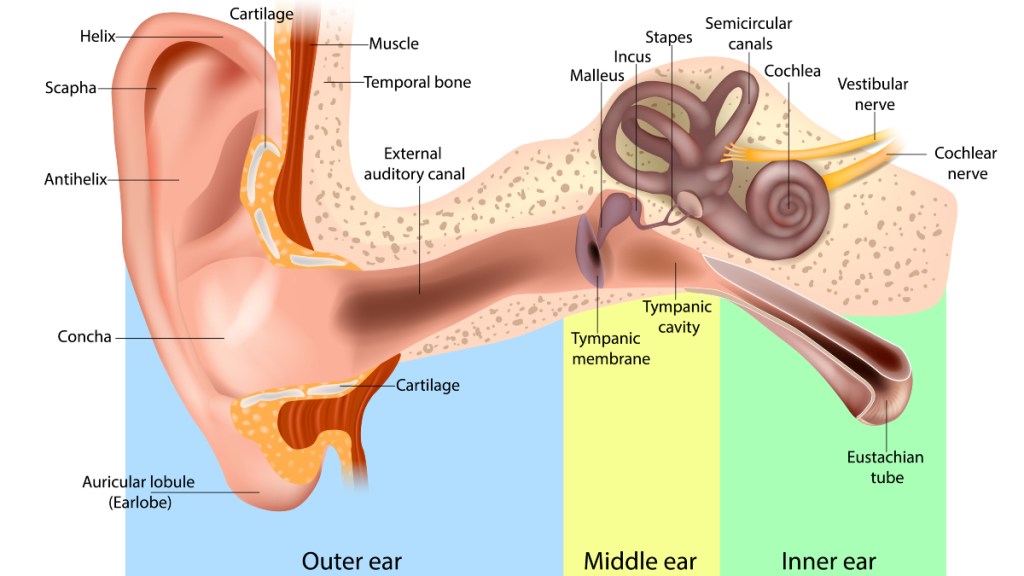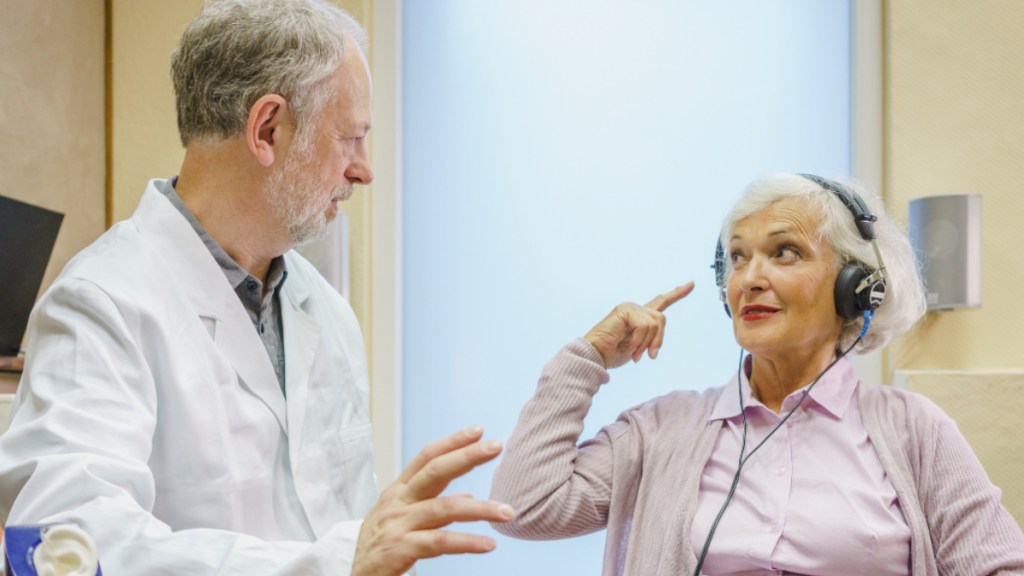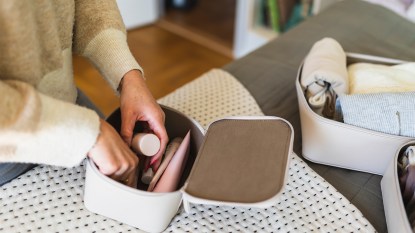MD-Approved Tricks to Sharpen Hearing Naturally — No Hearing Aid Required
These easy tricks ensure you never miss a word again

Need to turn up the volume when your favorite sitcom comes on lately? Or maybe you catch yourself saying “can you repeat that?” more often these days. While it’s true that your hearing changes with age, that doesn’t mean you need to resign yourself to dealing with muffled sounds or spring for a pricy custom hearing aid before you’re ready. Wondering how to hear better the easy way? Here, doctors reveal the simple, natural tricks to sharpen your hearing.
How hearing changes with age
A staggering 48 million Americans have hearing loss, and it’s the third most prevalent health condition in older adults. Age-related hearing loss, also known as presbycusis, affects hearing in both ears. It typically begins in your 50s and 60s, and it impacts about 1 in 3 people ages 65 to 74 and nearly half of adults 75 and older.
Experiencing at least some degree of hearing loss as you get older is a given, says Noam Bartuv, MD, an otologist, neurotologist and a clinical associate in the department of head and neck surgery and communication sciences at Duke University School of Medicine in Durham, NC. “We all lose some of our hearing as we age, and it progresses slowly,” he explains. “Everyone does lose some of their hearing, but it’s not that you lose all of it. Rather, in order to hear, you need more volume or amplification.”
Though you may not notice your hearing is going until you’re over 50, it’s actually been decreasing for years, says Frank Lin, MD, PhD, an ear, nose, and throat doctor and professor of otolaryngology at the Johns Hopkins University School of Medicine in Baltimore, MD. “Our hearing actually starts gradually diminishing over our entire lifetime as we accumulate exposure to loud noise, such as attending concerts and sporting events, and from the slow effects of aging,” says Dr. Lin, co-author of Hearing Loss for Dummies.
When you start to notice a change, it usually begins with having trouble with hearing higher frequencies or higher-pitched sounds, such as a tea kettle whistle, a siren or hissing noises, says Dr. Bartuv. People experiencing high frequency hearing loss can also have difficulty making out speech, especially in a noisy environment where conversations can sound muffled.
How your ears interpret sound
Your ear isn’t just what’s visible on the outside. The working parts of your ear go deep inside your head and work in tandem with your brain. There are three main parts: the outer ear, middle ear and inner ear. Sound waves pass through the outer ear and cause the eardrum, a thin piece of tissue that separates the outer ear from the middle ear, to vibrate.
The vibrations are shuttled through the tiny bones in the middle ear, which amplify the sound vibrations to the spiral-shaped cochlea. Attached to nerve cells in the cochlea are tiny hairs (thousands!) that convert the sound vibrations into electrical signals that are transmitted to the brain. The brain is what turns these electrical signals into sound.

Over the years, natural wear and tear from aging and exposure to loud noise can damage these tiny hairs. When this happens, the electrical signals aren’t transferred as well, causing hearing loss. “Each hair cell has a frequency, and that’s why hearing loss starts there,” says Dr. Bartuv. “As it progresses, we lose more and more hair cells. It starts affecting hearing in the higher frequencies and then goes to low frequencies.”
And Dr. Lin adds, “Because the hair cells don’t regrow, the hearing loss caused by the damage is permanent.”
Related: Ever Get an Annoying Crackling Sound in Your Ear? MD Shares the Easy Fix You Already Have on Hand
Hearing loss increases after menopause
Loss of estrogen can have an impact on hearing. “It’s likely estrogen has a protective role in the inner ear over time,” says Dr. Lin. “Before menopause, women have much less hearing loss than men. But past menopause, women’s hearing slowly diminishes when you’ve lost the protective effect of estrogen in your inner ear.”
But while menopause affects hearing, women generally are able to hear better (and for longer) than men. In fact, a study in The Lancet Regional Health Western Pacific found that men lose their hearing in higher frequency levels at a quicker rate compared to women. Since age-related hearing loss typically starts with difficulty hearing high-frequency sounds, this means men tend to experience age-related hearing loss earlier than women. (Hearing loss isn’t the only side effect of menopause. Click through to discover the best natural menopause treatments for issues like hot flashes and low libido.)
How hearing loss is diagnosed
An audiologist can help screen or diagnose hearing loss through an audiometry exam, which tests your ability to hear sounds. An otolaryngologist, also called an ear, nose and throat doctor, or ENT, can also diagnose and provide medical care or treatment.
“Getting screened annually for your hearing is something the vast majority of Americans don’t do,” says Dr. Lin. “Most probably haven’t had their hearing tested since they were in elementary school. People typically end up going to a doctor for their hearing when their spouse starts complaining that they can’t hear them.”
In fact, a study in Otology & Neurotology of U.S. adults between the ages of 50 and 80 found folks were more likely to have an annual physical exam (72%), a cholesterol test (70%), an eye exam (66%) or bring their pet to a vet (59%) compared to having their hearing evaluated (27%).

How to check your hearing at home
If you’re not ready to visit an audiologist just yet, you can start monitoring your hearing at home via Hearing Number, suggests Dr. Lin. The website, run by Johns Hopkins Cochlear Center for Hearing and Public Health, directs you to download one of two free apps, Mimi and SonicCloud, where you can take a hearing test.
After you’re done, you’ll get your hearing number. This indicates how loud speech needs to be for you to hear it (the lower the number, the better your hearing). “Teenagers often have a hearing number of around 0 decibels, which indicates they can hear incredibly soft sounds,” explains Dr. Lin. “But the average 40 year old has a hearing number of around 9, a 60 year old around 16 and the average 80 year old of around 35.” Your hearing number increases as you get older.
How to hear better naturally
While age-related hearing loss can’t be reversed, there are easy lifestyle tweaks you can make to hear better well into old age. Here’s what our experts recommend:
1. ‘Oil’ your ears
Stuck earwax is very common as you age, notes Dr. Lin. Why? “Earwax becomes less malleable, upping the risk it can get lodged inside your ear and not come out on its own,” he says. If you have a big buildup of wax inside your ears, it could block the ear canal and may even be severe enough to impair your hearing. (Click through to learn what dark ear wax means — and how to get rid of it.)
How do you know if your hearing problems might be from impacted wax? You’ll feel some fullness in the ear, says Dr. Bartuv. If this happens, “you can have your primary care doctor or ENT pull or suction out the excess wax,” he notes. “Another option is using over the counter drops at home to soften the wax.”
You can also try a DIY remedy, says Heather Moday, MD. Simply place 3 to 5 drops of baby oil or mineral oil in your ear. After 24 hours, fill a bulb syringe with warm water. Put a few drops of water in your ear, then tilt your ear toward your shoulder. This should allow the oil, water and wax to all drain out.
2. Bike around the block
Exercise promotes circulation to all parts of your body, including your ears. In one study of people ages 60 to 69, scientists noticed people with mild to severe hearing loss tended to exercise less than people with normal hearing. The more severe the hearing loss, the more likely the person was sedentary. Compared to those with no hearing loss, people with hearing loss were found on average to be sedentary for about 34 more minutes per day. That stands to reason that moving about more could reduce your risk of hearing trouble.
But that doesn’t mean you need to clock long runs or spend hours at the gym. Simply biking around the block, enjoying a brisk stroll or hiking with a friend all “count” as exercise. Aim for about 30 minutes of movement a day, at least 5 days a week to get the hearing protective benefits. (Feeling a bit unmotivated? Click through for exercise memes and jokes sure to make you giggle.)

3. Savor banana bread
Whipping up a loaf of banana bread does more than just tickle your tastebuds — it can safeguard your hearing with every delicious bite. Bananas are rich in the mineral potassium. And a study in Scientific Reports suggests high potassium intake levels are associated with a lower rate of hearing loss. Potassium regulates fluid in the inner ear. That’s important since a drop in fluid levels can contribute to hearing problems.
Bananas also contain magnesium, which plays a role in protecting against the damaging effects of noise. Loud sounds can prompt the production of free radicals, which harm hair cells in the inner ear. Magnesium helps block these free radicals, keeping your hearing sharp. (Click through to learn how to ripen bananas quickly so you can whip up a loaf ASAP!)

4. Pop in earplugs
The louder the sound, the faster your hearing can be damaged. And the longer you’re exposed to loud noise, the greater the risk for hearing loss. This is especially true when you’re not using some type of hearing protection or if there isn’t enough time for your ears to rest between noise exposures.
If you’re going to be in a high noise situation — like at a concert or fireworks display — it’s important to use ear protection, says Dr. Lin. “This means wearing noise-cancelling headphones or even standard ear muffs, for example, when you’re mowing the lawn.” One to try: Loop Quiet Ear Plugs (Buy from Amazon, $24.95).
5. Opt for smaller restaurants
Going out to eat can be a challenge when your hearing isn’t up to snuff. Surprisingly, the type of decor in the restaurant can play a big role in sharpening your hearing. It turns out the key to lessening the chance you won’t be able to hear your dining companion’s conversation is to pick a smaller restaurant with low ceilings and soft surfaces when possible, says Dr. Lin.
“In general, rooms with lower ceilings and soft accruements such as curtains, carpets and non-metallic surfaces are a lot easier to communicate in,” he says. “When you’re in a room with high ceilings and harder surfaces, sound can echo and reverberate, distorting communication and making the sound quality for speech a lot worse.”
For more ways to keep your hearing sharp for years to come:
New Research: Hearing Aids Help Ward Off Dementia — Study Author Reveals Who Benefits The Most
This content is not a substitute for professional medical advice or diagnosis. Always consult your physician before pursuing any treatment plan.













